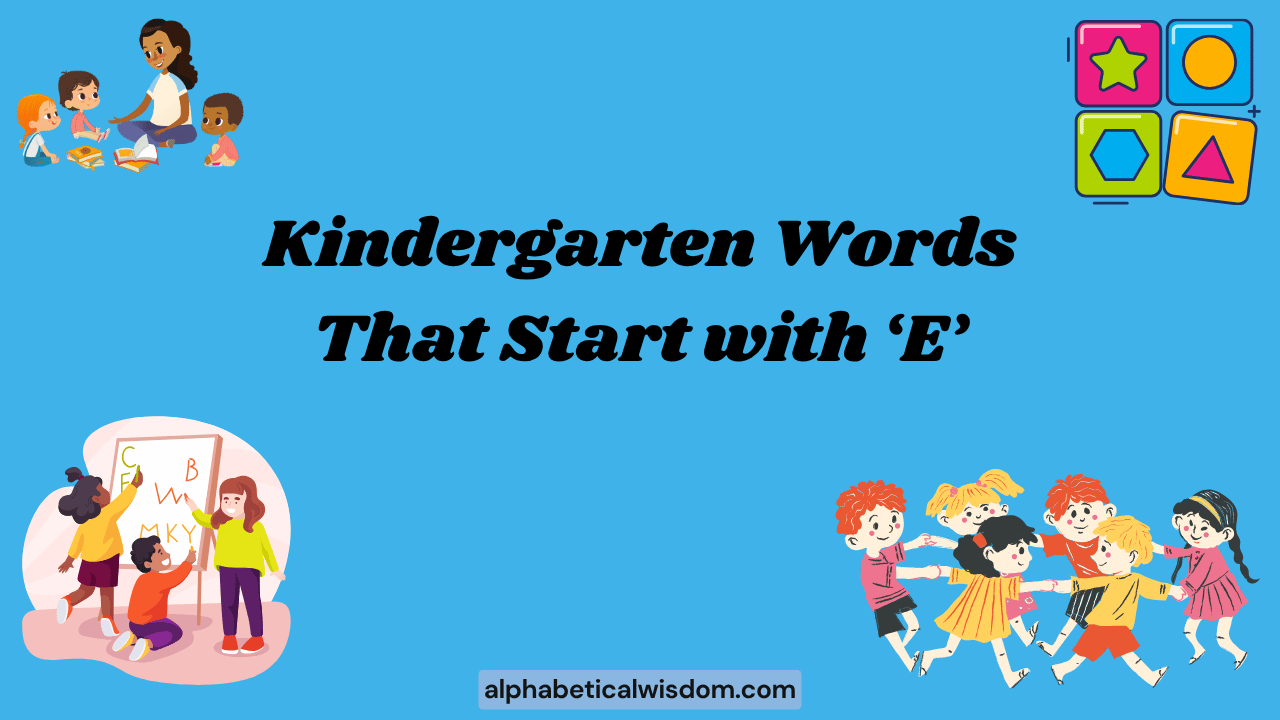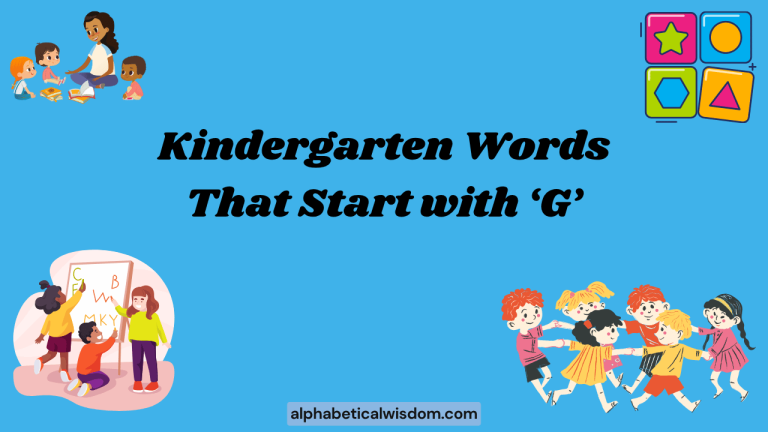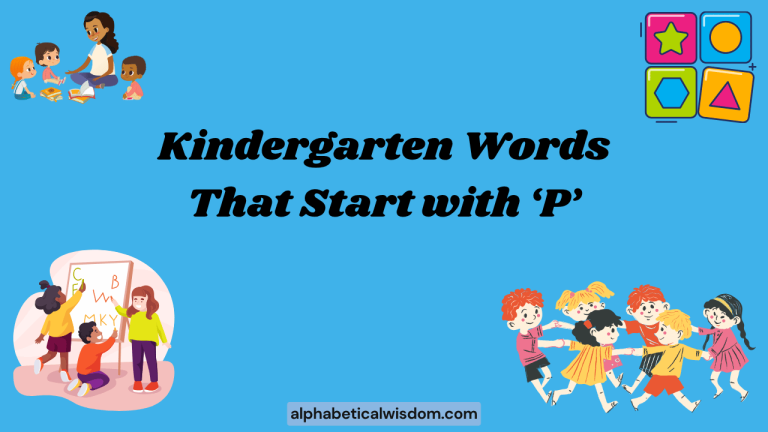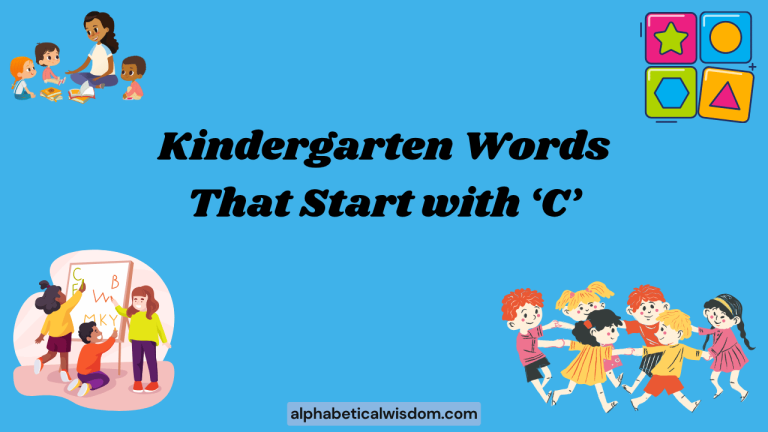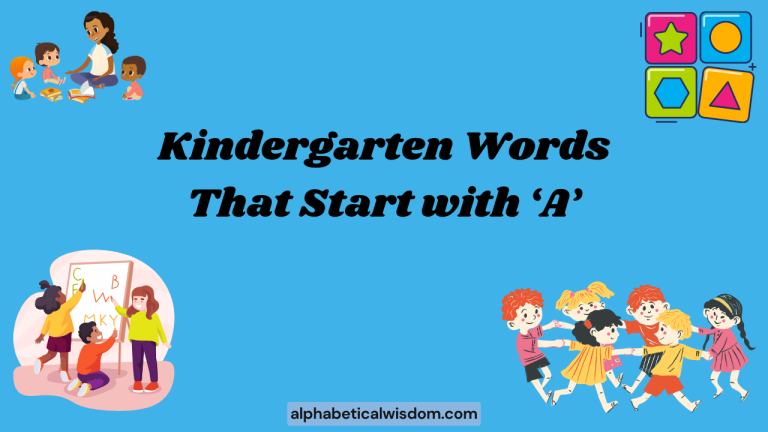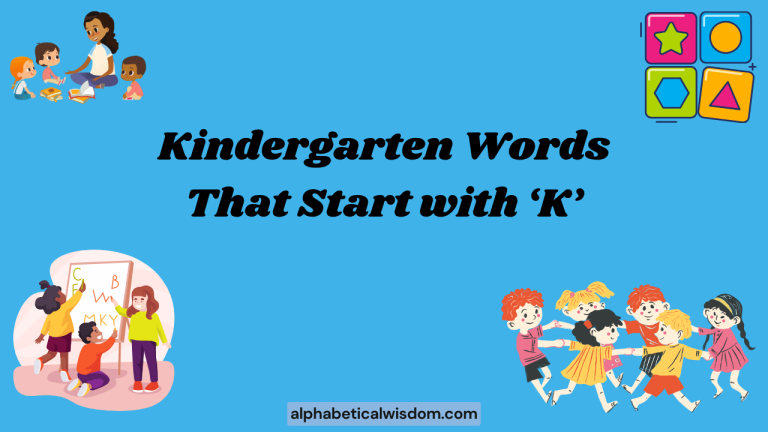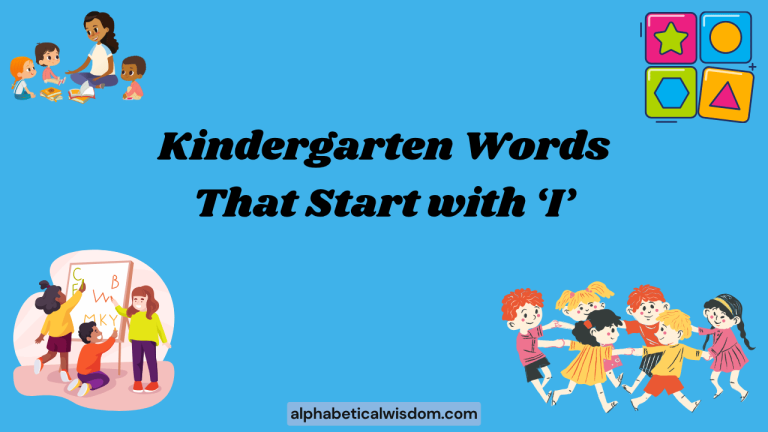Kindergarten Words Starting with E: A Comprehensive Guide
Understanding words that begin with the letter ‘E’ is a fundamental step in a child’s early literacy journey. These words not only expand a kindergartener’s vocabulary but also lay the groundwork for more advanced reading and writing skills.
This article provides a detailed exploration of common ‘E’ words suitable for kindergarteners, offering definitions, examples, usage rules, and practice exercises. It is designed for educators, parents, and anyone involved in early childhood education who wants to support young learners in mastering essential vocabulary.
Mastering these words enhances reading fluency and comprehension, while also improving spelling and writing abilities. This comprehensive guide will equip educators and parents with the resources needed to effectively teach and reinforce these crucial words, making learning both engaging and effective.
This guide is beneficial for kindergarten teachers, homeschooling parents, literacy tutors, and anyone supporting early childhood education. By understanding these concepts, educators can create more effective lesson plans and activities.
Table of Contents
- Introduction
- Definition of Words Starting with E
- Phonetics of ‘E’ Words
- Structural Breakdown of ‘E’ Words
- Types and Categories of ‘E’ Words
- Examples of ‘E’ Words
- Usage Rules for ‘E’ Words
- Common Mistakes with ‘E’ Words
- Practice Exercises
- Advanced Topics
- Frequently Asked Questions (FAQ)
- Conclusion
Definition of Words Starting with E
Words starting with the letter ‘E’ are a vital part of the English vocabulary, and they play a crucial role in early childhood literacy. These words, commonly encountered in kindergarten, cover a range of meanings and grammatical functions.
Understanding these words helps children build a strong foundation in reading, writing, and communication.
Classification: ‘E’ words can be classified into various parts of speech, including nouns (e.g., egg, ear), verbs (e.g., eat, enter), adjectives (e.g., easy, early), and adverbs (e.g., evenly, eagerly). Each part of speech serves a different function in a sentence.
Function: The primary function of ‘E’ words, like all words, is to convey meaning. Nouns name objects or concepts, verbs describe actions, adjectives modify nouns, and adverbs modify verbs, adjectives, or other adverbs. In kindergarten, children learn to use these words to express themselves and understand the world around them.
Contexts: ‘E’ words appear in a wide array of contexts, from everyday conversations to storybooks and educational materials. They are used to describe objects (e.g., “The elephant is big”), actions (e.g., “I eat my lunch”), and qualities (e.g., “The test was easy“). Recognizing and understanding these words in different contexts is essential for language development.
Phonetics of ‘E’ Words
The letter ‘E’ can produce different sounds depending on its position in a word and the surrounding letters. Understanding these phonetic variations is crucial for both reading and spelling.
Short E Sound
The short ‘E’ sound, represented phonetically as /ɛ/, is commonly found in words like egg, end, and elephant. This sound is often described as a relaxed, open vowel sound.
Long E Sound
The long ‘E’ sound, represented phonetically as /iː/, is typically heard in words like eat, even, and eagle. This sound is longer and more emphasized than the short ‘E’ sound.
Silent E
In many words, the letter ‘E’ is silent but affects the pronunciation of the preceding vowel, making it a long vowel sound. Examples include cake, name, and time. While not common in kindergarten words starting with ‘E’, understanding the concept of silent E is important for future learning.
Examples of Phonetic Variations
- Short E: Egg (/ɛɡ/), End (/ɛnd/), Elf (/ɛlf/)
- Long E: Eat (/iːt/), Eve (/iːv/), Equal (/ˈiːkwəl/)
Structural Breakdown of ‘E’ Words
Understanding the structure of words starting with ‘E’ can help children decode and spell them more easily. This section breaks down common structural elements found in these words.
Common Prefixes
While prefixes are more common in advanced vocabulary, some basic prefixes are used with ‘E’ words, such as “en-” or “em-“. These prefixes can change the meaning of the root word.
Root Words
Many ‘E’ words serve as root words, which can be combined with prefixes or suffixes to create new words. For example, eat can be combined with “-ing” to form eating.
Common Suffixes
Suffixes like “-ed,” “-ing,” and “-er” can be added to ‘E’ words to change their tense or function. For instance, end can become ended or ending.
Syllable Structure
‘E’ words can be single-syllable (e.g., egg, eat) or multi-syllable (e.g., eagle, evening). Understanding syllable structure helps children break down longer words for easier pronunciation.
Types and Categories of ‘E’ Words
Categorizing ‘E’ words can help children understand their different functions and meanings. Here are some common categories of ‘E’ words suitable for kindergarteners.
Nouns
Nouns are words that name people, places, things, or ideas. Common ‘E’ nouns for kindergarteners include egg, ear, eye, elf, and elephant.
Verbs
Verbs are words that describe actions or states of being. Examples of ‘E’ verbs include eat, enter, explore, erase, and enjoy.
Adjectives
Adjectives are words that describe nouns. ‘E’ adjectives suitable for kindergarteners include easy, early, empty, equal, and even.
Adverbs
Adverbs modify verbs, adjectives, or other adverbs, often indicating how, when, or where something is done. While less common in early vocabulary, examples include evenly and eagerly (in simpler contexts).
Examples of ‘E’ Words
This section provides extensive examples of ‘E’ words, categorized by part of speech, to illustrate their usage and meaning. These examples are designed to be accessible and relevant for kindergarten-age children.
Examples of Nouns Starting with E
Nouns are naming words. Here’s a table with examples of nouns starting with “E”:
| Noun | Example Sentence |
|---|---|
| Egg | The hen laid an egg. |
| Ear | I listen with my ear. |
| Eye | I see with my eye. |
| Elf | The elf helped Santa. |
| Elephant | The elephant is very big. |
| Earth | We live on Earth. |
| East | The sun rises in the east. |
| Edge | Be careful at the edge of the table. |
| Effort | He put in a lot of effort to finish the race. |
| Emerald | She has an emerald ring. |
| Empire | The Roman Empire was very powerful. |
| Employee | The employee works at the store. |
| Energy | I need energy to play. |
| Engine | The car has a powerful engine. |
| Entrance | The entrance to the zoo is over there. |
| Envelope | I put the letter in an envelope. |
| Environment | We should protect the environment. |
| Era | We are in a new era of technology. |
| Error | There is an error in this calculation. |
| Example | Here is an example of a sentence. |
| Exercise | Swimming is a good exercise. |
| Exit | The exit is to the left. |
| Expert | My dad is an expert in math. |
| Event | The school has a fun event next week. |
| Evening | We eat dinner in the evening. |
| Experience | Going to the zoo was a great experience. |
| Expression | Her face had a happy expression. |
| Explanation | The teacher gave a clear explanation. |
| Extent | To what extent will this work? |
Examples of Verbs Starting with E
Verbs are action words. Here’s a table with examples of verbs starting with “E”:
| Verb | Example Sentence |
|---|---|
| Eat | I eat my breakfast. |
| Enter | Please enter the room. |
| Explore | Let’s explore the forest. |
| Erase | I can erase my mistakes. |
| Enjoy | I enjoy playing games. |
| Earn | I earn money by doing chores. |
| Ease | The medicine will ease the pain. |
| Edit | I need to edit my essay. |
| Educate | Schools educate children. |
| Elect | We will elect a class president. |
| Elevate | The platform will elevate the speaker. |
| Eliminate | We need to eliminate the errors. |
| Embrace | Let’s embrace new opportunities. |
| Emerge | The sun will emerge from behind the clouds. |
| Employ | The company will employ new workers. |
| Empower | Education can empower individuals. |
| Empty | Please empty the trash can. |
| Enable | This tool will enable us to work faster. |
| Enclose | Please enclose the documents in the envelope. |
| Encode | We can encode the message for security. |
| Endure | We must endure the hardships. |
| Engage | The speaker will engage the audience. |
| Enhance | We can enhance the flavor with spices. |
| Enlarge | Can you enlarge the picture? |
| Enlighten | The book will enlighten you on the subject. |
| Enlist | We need to enlist help from volunteers. |
| Ensure | Please ensure the door is locked. |
| Entail | The job will entail a lot of travel. |
| Entice | The smell of cookies will entice you. |
Examples of Adjectives Starting with E
Adjectives are describing words. Here’s a table with examples of adjectives starting with “E”:
| Adjective | Example Sentence |
|---|---|
| Easy | The test was easy. |
| Early | I wake up early. |
| Empty | The glass is empty. |
| Equal | The two sides are equal. |
| Even | The ground is even. |
| Elegant | She wore an elegant dress. |
| Elite | The team is an elite group of athletes. |
| Eloquent | The speaker was very eloquent. |
| Embarrassed | He felt embarrassed after tripping. |
| Eminent | The professor is an eminent scholar. |
| Emotional | The movie was very emotional. |
| Empathetic | She is an empathetic listener. |
| Empty | The box is empty. |
| Enchanting | The forest was enchanting. |
| Endless | The road seemed endless. |
| Energetic | The puppy is very energetic. |
| Engaged | The audience was fully engaged. |
| Enjoyable | The trip was very enjoyable. |
| Enormous | The whale is an enormous animal. |
| Entertaining | The show was very entertaining. |
| Enthusiastic | The students are enthusiastic about the project. |
| Enticing | The aroma of food was enticing. |
| Entire | I ate the entire pizza. |
| Envious | She felt envious of her friend’s success. |
| Epic | The movie was an epic adventure. |
| Equal | The portions are equal. |
| Equipped | The team is well equipped for the challenge. |
| Essential | Water is essential for life. |
| Established | The company is well established. |
Examples of Adverbs Starting with E
Adverbs modify verbs, adjectives, or other adverbs. Here’s a table with examples of adverbs starting with “E”:
| Adverb | Example Sentence |
|---|---|
| Evenly | Spread the butter evenly. |
| Eagerly | The dog waited eagerly for his treat. |
| Early | I woke up early this morning. |
| Easily | The puzzle was solved easily. |
| Effectively | The medicine worked effectively. |
| Efficiently | The team worked efficiently to finish the project. |
| Elaborately | The cake was decorated elaborately. |
| Elegantly | She danced elegantly across the stage. |
| Emotionally | He reacted emotionally to the news. |
| Empathetically | She listened empathetically to her friend. |
| Equally | The prize was divided equally among the winners. |
| Erroneously | The information was reported erroneously. |
| Especially | I like chocolate, especially dark chocolate. |
| Essentially | Essentially, the plan is complete. |
| Even | Even if it rains, we will go to the park. |
| Eventually | Eventually, we will reach our destination. |
| Exactly | That is exactly what I meant. |
| Exclusively | The shop sells exclusively handmade items. |
| Excitedly | The children ran excitedly to the playground. |
| Explicitly | The instructions were stated explicitly. |
| Expressively | She spoke expressively about her feelings. |
| Extensively | The topic was researched extensively. |
| Extremely | The weather is extremely hot today. |
| Effortlessly | She did the assignment effortlessly. |
| Everywhere | The flowers grew everywhere in the garden. |
| Evidently | Evidently, they were not home. |
| Evocatively | He described the scene evocatively. |
| Exuberantly | The crowd cheered exuberantly. |
| Eternally | I will be eternally grateful. |
Usage Rules for ‘E’ Words
Understanding the rules governing the use of ‘E’ words helps children use them correctly in sentences. This section covers some key usage rules.
Subject-Verb Agreement
Verbs must agree with their subjects in number. For example, “I eat” (singular) versus “They eat” (plural).
Adjective Placement
Adjectives usually come before the nouns they modify. For example, “an easy test.”
Adverb Placement
Adverbs can be placed in various positions in a sentence, depending on the emphasis desired. For example, “I eagerly waited” or “Eagerly, I waited.”
Capitalization
‘E’ words, like all words, should be capitalized at the beginning of a sentence or when they are proper nouns (e.g., Earth).
Common Mistakes with ‘E’ Words
Identifying and correcting common mistakes is an essential part of the learning process. This section highlights some frequent errors made with ‘E’ words.
Misspelling
Common misspellings include confusing “ear” with “ere” or “air,” or misspelling “easy” as “eazy.”
Incorrect Verb Tense
Using the wrong tense of a verb, such as saying “I eated” instead of “I ate,” is a common mistake.
Confusing Similar Words
Children may confuse words that sound similar but have different meanings, such as “even” and “evening.”
Here are some common mistakes:
| Incorrect | Correct | Explanation |
|---|---|---|
| I eated the apple. | I ate the apple. | “Ate” is the correct past tense of “eat.” |
| The test was eazy. | The test was easy. | “Easy” is the correct spelling. |
| I here you. | I hear you. | “Hear” refers to listening. |
Practice Exercises
These practice exercises are designed to reinforce understanding of ‘E’ words. They include fill-in-the-blank questions, sentence completion tasks, and word identification activities.
Exercise 1: Fill in the Blank
Complete the following sentences with the correct ‘E’ word from the word bank: egg, eat, easy, ear, elephant.
| Question | Answer |
|---|---|
| 1. I can hear with my _____. | ear |
| 2. I like to _____ my lunch. | eat |
| 3. The _____ is a big animal. | elephant |
| 4. The test was very _____. | easy |
| 5. The hen laid an _____. | egg |
| 6. The math problem was _____. | easy |
| 7. Birds lay an _____. | egg |
| 8. I _____ cereal for breakfast. | eat |
| 9. Dogs have good _____. | ear |
| 10. An _____ has a long trunk. | elephant |
Exercise 2: Sentence Completion
Complete the following sentences using an appropriate ‘E’ word.
| Question | Answer |
|---|---|
| 1. I want to _____ the game. | enjoy |
| 2. Please _____ the room quietly. | enter |
| 3. The box is _____. | empty |
| 4. The two groups are _____. | equal |
| 5. I woke up _____. | early |
| 6. We will _____ new lands. | explore |
| 7. Be _____ to help others. | eager |
| 8. Please _____ the board. | erase |
| 9. Give _____ to your work. | effort |
| 10. An _____ is green. | emerald |
Exercise 3: Word Identification
Identify the words that start with the letter ‘E’ in the following list.
| List of Words | Words Starting with ‘E’ |
|---|---|
| Apple, Egg, Ball, Elephant, Cat, Ear, Dog | Egg, Elephant, Ear |
| Fun, Eat, Game, House, Ice, Enter, Jump | Eat, Enter |
| King, Lion, Moon, Nest, Open, Easy, Pig | Easy |
| Queen, Run, Sun, Tree, Umbrella, Even, Van | Even |
| Window, Box, Yellow, Zebra, Explore, Ant, Bug | Explore |
| Door, Floor, Empty, Gate, Hat, Ink, Jug | Empty |
| Lamp, Mouse, Nice, Orange, Early, Pen, Quilt | Early |
| River, Sit, Top, Under, Verb, Eye, Wall | Eye |
| Xray, Yard, Zebra, Apple, Explore, Ball, Cat | Explore |
| Dog, Enter, Fun, Game, Hat, Ink, Jug | Enter |
Advanced Topics
For advanced learners, exploring more complex aspects of ‘E’ words can be beneficial.
Etymology
Investigating the origins and historical development of ‘E’ words can provide deeper insights into their meanings and usage.
Figurative Language
Exploring how ‘E’ words are used in metaphors, similes, and other forms of figurative language can enhance comprehension and creative writing skills.
Idioms
Understanding idioms that contain ‘E’ words, such as “eager beaver” or “easy as pie,” can improve vocabulary and cultural literacy.
Frequently Asked Questions (FAQ)
This section addresses common questions that learners may have about ‘E’ words.
- Q: Why is it important for kindergarteners to learn words starting with ‘E’?
A: Learning ‘E’ words is crucial for expanding vocabulary, improving reading and writing skills, and building a strong foundation for future language development. These words are commonly encountered in early learning materials and everyday conversations. - Q: What are some strategies for teaching ‘E’ words to young children?
A: Effective strategies include using flashcards, reading books with ‘E’ words, playing word games, and incorporating ‘E’ words into daily activities and conversations. Multisensory approaches, such as using visual aids and tactile materials, can also be helpful. - Q: How can I help my child practice ‘E’ words at home?
A: Parents can support their child’s learning by reading together, creating ‘E’ word lists, playing word games, and encouraging the child to use ‘E’ words in their speech and writing. Providing a supportive and engaging learning environment is key. - Q: What are some common challenges children face when learning ‘E’ words?
A: Common challenges include difficulty distinguishing between the short and long ‘E’ sounds, misspelling words, and confusing words with similar sounds but different meanings. Addressing these challenges with targeted instruction and practice is important. - Q: How can I make learning ‘E’ words fun and engaging?
A: Make learning fun by incorporating games, songs, and interactive activities. Use colorful visual aids, create silly sentences with ‘E’ words, and reward effort and progress. Positive reinforcement can motivate children to learn. - Q: What is the difference between the short and long ‘E’ sound?
A: The short ‘E’ sound (/ɛ/) is a relaxed, open vowel sound, as in “egg.” The long ‘E’ sound (/iː/) is a longer, more emphasized sound, as in “eat.” Understanding this difference is crucial for pronunciation and spelling. - Q: Are there any tricks to help remember how to spell ‘E’ words?
A: Use mnemonic devices, such as associating a word with a picture or creating a rhyme. Break down words into syllables and focus on the individual sounds. Practice writing the words repeatedly to reinforce spelling. - Q: How do I know if my child is struggling with ‘E’ words and needs extra help?
A: Signs of struggle include difficulty pronouncing ‘E’ words, frequent misspellings, reluctance to use ‘E’ words in speech or writing, and frustration with learning activities. If you notice these signs, provide extra support and consider seeking help from a teacher or tutor. - Q: What are some additional resources for learning ‘E’ words?
A: There are many online resources, including educational websites, interactive games, and printable worksheets. Libraries and bookstores also offer a wide range of books and materials for early literacy development. - Q: How can I assess my child’s understanding of ‘E’ words?
A: Assessment methods include asking the child to identify ‘E’ words in a list, complete sentences with ‘E’ words, and use ‘E’ words in their own writing. Observing the child’s pronunciation and usage of ‘E’ words in everyday conversations can also provide valuable insights.
Conclusion
Mastering words that start with the letter ‘E’ is a foundational step in a kindergartener’s literacy journey. By understanding the definitions, phonetics, structural elements, and usage rules of these words, children can build a strong vocabulary and improve their reading, writing, and communication skills.
Educators and parents play a crucial role in supporting this learning process through engaging activities, targeted instruction, and positive reinforcement.
Remember to focus on making learning fun and relevant, addressing common mistakes, and providing ample opportunities for practice. With consistent effort and support, young learners can confidently master ‘E’ words and continue to grow as readers and writers.
Encourage children to explore new words, ask questions, and embrace the joy of learning.
